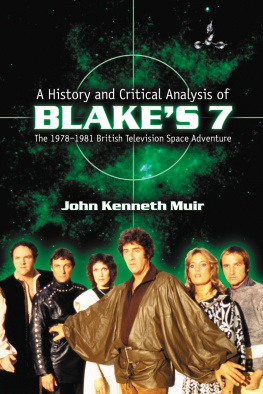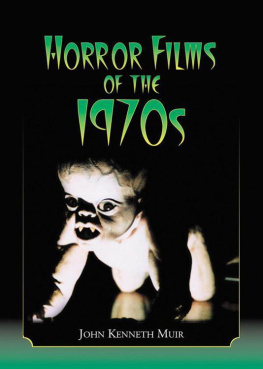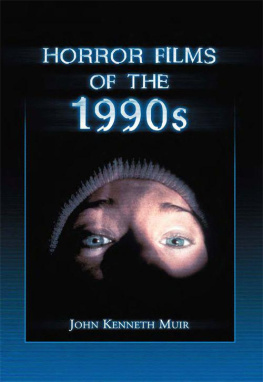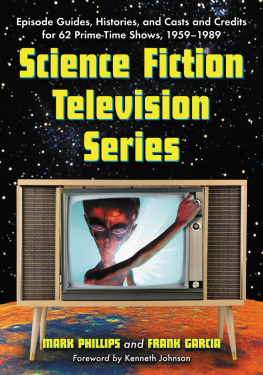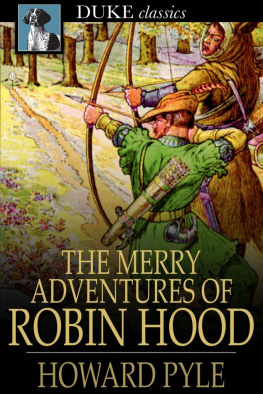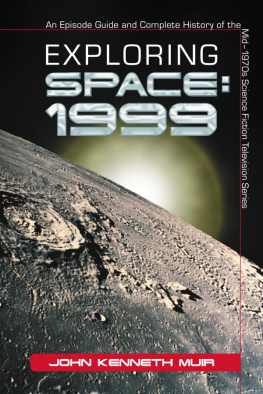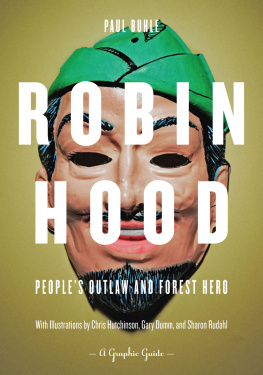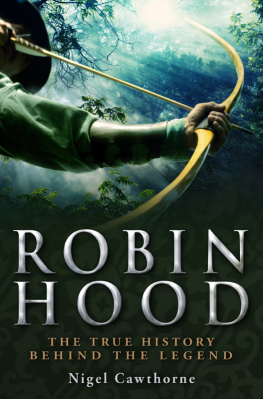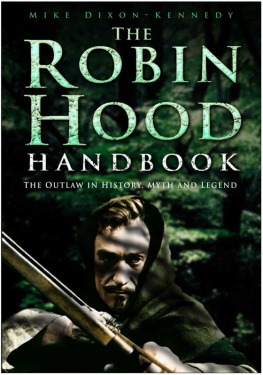
Also by JOHN KENNETH MUIR AND FROM McFARLAND
Horror Films of the 1980s (2007; paperback 2012)
Horror Films of the 1990s (2011)
Eaten Alive at a Chainsaw Massacre: The Films of Tobe Hooper (2002; paperback 2009)
Horror Films of the 1970s (2002; paperback 2008)
Terror Television: American Series, 19701999 (2001; paperback 2008)
A Critical History of Doctor Who on Television (1999; paperback 2008)
The Encyclopedia of Superheroes on Film and Television, 2d ed. (2008)
An Analytical Guide to Televisions One Step Beyond, 19591961 (2001; paperback 2006)
The Films of John Carpenter (2000; paperback 2005)
An Analytical Guide to Televisions Battlestar Galactica (1999; paperback 2005)
Exploring Space: 1999: An Episode Guide and Complete History of the Mid1970s Science Fiction Television Series (1997; paperback 2005)
Wes Craven: The Art of Horror (1998; paperback 2004)
A History and Critical Analysis of Blakes 7, the 19781981 British Television Space Adventure
JOHN KENNETH MUIR
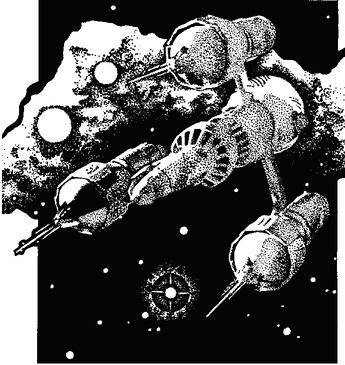

McFarland & Company, Inc., Publishers
Jefferson, North Carolina
For the Leftwich family.
And to the memory of Terry Nation.
Title page: Roj Blakes magnificent spaceship the Liberator sets sail for freedom. Illustration by Mindy Easler.
LIBRARY OF CONGRESS CATALOGUING DATA ARE AVAILABLE
BRITISH LIBRARY CATALOGUING DATA ARE AVAILABLE
ISBN-13: 978-0-7864-2660-7
2000 John Kenneth Muir. All rights reserved
No part of this book may be reproduced or transmitted in any form or by any means, electronic or mechanical, including photocopying or recording, or by any information storage and retrieval system, without permission in writing from the publisher.
On the cover: The cast of Blakes 7 (BBC); background 2006 PhotoSpin
McFarland & Company, Inc., Publishers
Box 611, Jefferson, North Carolina 28640
www.mcfarlandpub.com
Introduction
The most memorable science fiction programs in television history have often been those which deliberately modify classic stories or myths and reiterate them in new and exciting contexts, frequently the outer space arena. The long-honored genre standard-bearer Star Trek (196669) is an extension of American pioneer and imperialist ideals and was even referred to by its creator Gene Roddenberry as Wagon Train to the Stars. Irwin Allens Lost in Space (196568) is a futuristic re-telling of The Swiss Family Robinson with a family, again the Robinsons, marooned on a far off planet rather than an isolated island. Even the much-maligned Glen Larson saga Battlestar Galactica (1978-79) is a quasiBiblical epic in its vision of the human races cosmic exodus and passage through a red space field, a galactic equivalent of the Red Sea.
Similarly, Terry Nations unique British entry in the science fiction television sweepstakes, Blakes 7 (197881), is a futuristic accumulation and translation of classical literary, film and television traditions. It is part Robin Hood with its band of futuristic outlaws facing the overwhelming power of an evil Galactic Empire and part The Seven Samurai (1954) or The Magnificent Seven (1960) in its thematic predisposition to dramatize heroes defending the innocent from conquering forces both alien and human. Unlike Robin Hood, however, Blakes 7s television avengers are noticeably not merry men.
On the contrary, the heroes of Blakes 7 are depicted in this four-year, 52-episode BBC series as a desperate, fatalistic and determinedly pragmatic band. Although Blake is a man of honor, his mind starts to break down after the death of a follower (Pressure Point) and his continued failure to defeat the mighty Terran Federation. Blakes righthand man, Avon, is even less traditional. Equipped with a razor-sharp intellect and an instinct for self-preservation, Avon chooses to accompany Blake on his cosmic quest only because it suits his purposes. In the words of creator Nation, his television series is not about outer space or alien civilizations at all. Instead, it concerns the little guy against City Hall. The heroes, including a loyal everyman, a beautiful smuggler and a common thief, are thus defined in totally realistic and believable, non-superhuman terms.
When one considers that so many popular science fiction shows, from classic Star Trek to Babylon 5 (199398), are endorsements of overreaching futuristic military forces proffering peace, whether it be Starfleet in Trek, the Earth alliance in Babylon 5, the Directorate in Buck Rogers in the 25th Century (197981) or even the United Earth Oceans of SeaQuest DSV (199396), this anti-establishment thematic strand marks Blakes 7 as a unique addition to the genres video pantheon. It is a relief to report that Blakes 7 protagonists do not hold military rank, wear neatly ironed uniforms or work together in a tightly structured hierarchy for the enrichment of mankind. They are not pioneers or diplomats, but rather very human outlaws fighting a vicious battle against injustice. Fortunately, Blakes 7 is a provocative drama worthy of scrutiny for reasons beyond its rejection of traditional genre tropes.
Unlike its British contemporaries in the 70s, namely Space: 1999 (197577), Star Maidens (1976) and Doctor Who (196389), each episode in this Terry Nation series does not comprise a single adventure. Instead, each story builds on previous ones and plays as a chapter in a magnum opus: a video novel about the liberation of an oppressed galaxy. In the 90s, the heyday of Babylon 5, Deep Space Nine (199399) and other shows featuring so-called story arcs, this innovation is often underestimated or unreported. Yet Blakes 7 developed the arc concept in sci-fi television a dozen years before the above-listed series were aired or conceived.
Blakes 7 is also a less frivolous series than many genre dramas in vogue today. As if manipulated by a diabolical puppet master, the series is savage in its treatment of beloved characters and icons. Main characters, including Blake himself, disappear or are killed. The beloved starship Liberator, which during three years of service developed a distinct and friendly persona, is torn apart by a corrosive alien compound in the third-season cliffhanger Terminal. The most cutthroat but not unanticipated moment comes in the series finale Blake when all the series protagonists are brutally gunned down in what remains 20 years later an unresolved cliffhanger. Simply put, Blakes 7 takes no prisoners. Fortunately, its Machiavellian nature perfectly fits the tenor of the resistance premise, and the totalitarian Federation often wins the day.
Also lending the series a unique gritty feel is the fact that Blakes 7 was lensed by the penny-pinching BBC on an exceedingly low budget. The sets are bare, even minimalist, and the futuristic hardware and instrumentation look like cast-off remnants from a fallen technological race. By necessity the series often was shot in nuclear power plants and dusty quarries (lovingly called chalk pits by film crews), so the planets visited by Blakes team are either oppressively sterile and industrial, or barren and dying. The unexpected but welcome result of these cheap production expedients is that
Next page
